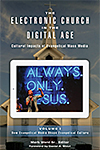UHV associate professor’s research on electronic church wins award
A University of Houston-Victoria faculty member recently received a national award for his work compiling and editing a two-volume book series about the effect of mass media in evangelical churches.
Mark Ward Sr., a UHV associate professor of communication, received the 2017 Clifford G. Christians Ethics Research Award for his work as editor of the two-volume book series “The Electronic Church in the Digital Age: Cultural Impacts of Evangelical Mass Media.”
The award is named for Clifford G. Christians, professor emeritus at the University of Illinois at Urbana-Champaign, a leading media theorist and ethicist with a special interest in the relationship between media, technology and culture. The award honors research that serves to “interpret and apply concepts employed in Christians’ work in new and insightful ways.”
The Carl Couch Center for Social and Internet Research presents the award annually to those who advance knowledge of important theoretical issues in the areas of ethics, mass communication theory, and the relationship between media, technology and culture.
“Many people think that the electronic church went away after the televangelism scandals of the late 1980s,” Ward said. “But evangelical Christian mass media has proliferated through the internet and digital media technologies. These developments raise new questions about the relationship between media and religion.”
Ward pointed to two trends. First, with so many media choices, audiences have fragmented so that religious programming is consumed mostly by people who already identify with a given religious community. Second, the media industry has been deregulated, and the electronic church now is dominated by large media conglomerates.
“Religious media personalities are no longer public figures but mostly celebrities within their own community and thus less accountable,” said Ward. “At the same time, conglomeration means the number of religious voices has become fewer and less diverse but with the resources to spread the most popular voices across a far wider range of digital media channels.”
To explore the electronic church in the digital age, Ward recruited more than 20 scholars to write chapters for the two volumes in the series. Each scholar surveyed actual media content from evangelical radio, TV or internet sites, and then described how the content shapes and reflects the culture of American evangelicalism – a community with which one in four U.S. adults identifies.
Ward wrote introductions to each volume, contributed a chapter to each, and compiled a chronology of the electronic church from the 1800s to the present, plus a listing of major evangelical networks and media personalities.
Daniel A. Stout, a scholar of media and religion, wrote a foreword to Ward’s books stating that the books represent a dramatic turn in media and religion research by exploring how audiences form a religious community with its own distinctive culture through their shared interpretation of religious media content.
Chapters in Ward’s books deal with media genres, including televangelism, radio teaching and preaching, evangelical talk radio, contemporary Christian music radio, internet sites, mobile apps, streaming worship and Christian video games.
The University of Houston-Victoria, located in the heart of the Coastal Bend region since 1973 in Victoria, Texas, offers courses leading to more than 80 academic programs in the schools of Arts & Sciences; Business Administration; and Education, Health Professions & Human Development. UHV provides face-to-face classes at its Victoria campus, as well as an instructional site in Katy, Texas, and online classes that students can take from anywhere. UHV supports the American Association of State Colleges and Universities Opportunities for All initiative to increase awareness about state colleges and universities and the important role they have in providing a high-quality and accessible education to an increasingly diverse student population, as well as contributing to regional and state economic development.
Lauren Hightower-Emerson
361-570-4342






